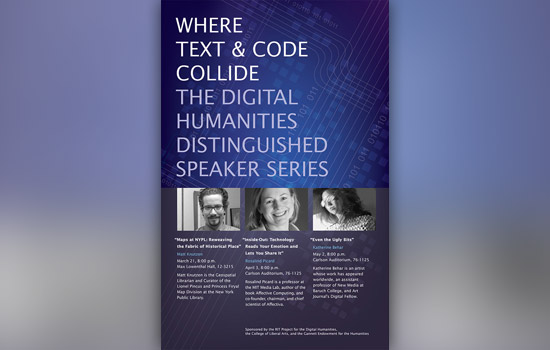RIT introduces digital humanities speaker series
Three upcoming lectures examine intersection of humanities, science and technology
The College of Liberal Arts at Rochester Institute of Technology has created a new lecture series that will examine the digitalization of the humanities, along with the ways that the humanities have affected our relationships with science and technology.
The study of the humanities—languages, literature, philosophy, religion, performing arts and social sciences, and those disciplines that study the human experience—has been challenged by new technology and changed the way we interact with the digital world. As a result, we can quickly access digitized global cultural heritage materials; archives and collections that at one time could only be viewed on site are now readily visible with the click of a mouse; and art can be experienced through multi-media installations.
“Where Text and Code Collide: The Digital Humanities Distinguished Speaker Series” will explore what happens when new technologies meet with the humanities. Matt Knutzen, from the Lionel Pincus and Princess Firyal Map Division of the New York Public Library, is the inaugural speaker at 8 p.m. Thursday, March 21, in Max Lowenthal Hall, room 3215.
Knutzen works with one of the world’s premier map collections in terms of size, scope, holdings and diversity. The Map Division at the NYPL recently announced the launch of a project to align material historical maps with the digital mapping technology. Knutzen will describe the process of georectification, or warping, in which old atlas sheets are stitched together tile by tile into historical layers that allows researchers to study and compare past cityscapes with present-day cityscapes.
“The most exciting aspect of this project is its participatory nature, meaning that anybody with a computer can create an account, log in and begin warping and tracing maps,” says Knutzen. “Your contribution remains in place and becomes part of a larger project.”
Knutzen’s project was awarded the 2012 Cutting-Edge Technology in Library Services award from the Office of Information Policy of the American Library Association.
“Matt Knutzen’s talk is important because it demonstrates the interaction of historical geography with contemporary geoinformation systems, both of which allow us to ask new questions and make new discoveries,” says Lisa Hermsen, chair of RIT’s English department. “Old maps are beautiful and can be saved in digital repositories for future use like warping and mashing. All of the talks in the series will address the near limitless possibilities when new technologies meet the humanities and when the humanities greet these with creative and critical applications.”
Other upcoming lectures include:
- Rosalind Picard, founder and director of the Affective Computing Research Group at the Massachusetts Institute of Technology Media Laboratory, 8 p.m. Wednesday, April 3, in the Chester F. Carlson Center for Imaging Science, room 1125
- Katherine Behar, an interdisciplinary new media and performance artist and assistant professor of new media at Baruch College, 8 p.m. Thursday, May 2, in the Chester F. Carlson Center for Imaging Science, room 1125
All presentations—free and open to the public—are sponsored by the RIT Project for the Digital Humanities, College of Liberal Arts, and Gannett Endowment for the Humanities.










